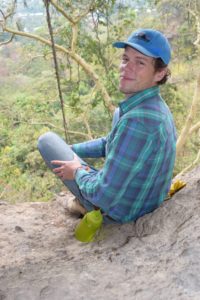 I am Matiss Castorena. I am doing my PhD at the University of Arizona in Ecology and Evolutionary Biology. I was born in Mexico City, and I did my undergrad and master’s in Mexico’s National University (UNAM). My background is plant functional ecology, mainly around plant allometry, biomechanics, hydraulics, and metabolism, using the comparative method. Doing my research has led me to explore plant diversity across many species with different types of cells and tissue arrangements, growth forms, and ecological strategies across several environments. Currently, I am interested in developing an efficient way to measure total plant respiration to study how respiration rate varies from seedlings to mature individuals across and within species.
I am Matiss Castorena. I am doing my PhD at the University of Arizona in Ecology and Evolutionary Biology. I was born in Mexico City, and I did my undergrad and master’s in Mexico’s National University (UNAM). My background is plant functional ecology, mainly around plant allometry, biomechanics, hydraulics, and metabolism, using the comparative method. Doing my research has led me to explore plant diversity across many species with different types of cells and tissue arrangements, growth forms, and ecological strategies across several environments. Currently, I am interested in developing an efficient way to measure total plant respiration to study how respiration rate varies from seedlings to mature individuals across and within species.
I am greatly looking forward to being in the PFT4 course in Svalbard! I want to learn the most updated information in plant trait-based ecology, specially about field techniques and data analysis. Also, I want to practice collaborative work with international partners. We will be working in several teams to address several research questions in trait-based ecology. The final product will be presented at the end of the course as a way to know if we learnt the essentials for trait-based ecological research. I’ll particularly learn about how respiration is related to functional trait variation and how to measure it with highly specialized equipment. I am really excited to visit Svalbard ‘s unique flora and to assist the PFT4 course for my academic development.
I anticipate that people in Svalbard think that climate change is occurring. Artic environments are one of the most endangered ones as planet keeps warming up and glaciers are thawing. I think this should be really noticeable for people in Svalbard. The thing that I am not sure to anticipate is whether people in Svalbard think that global warming is largely caused by human activities or not. Awareness for this issue mostly depends on people curiosity for scientific information rather than having an empirical experience.
In general, mexicans are somehow aware that climate is changing because of human activities, but without a clear idea of which human activities are the ones that most contribute to climate change and what climatic tendencies are expected in the future. There is just the idea that climate is changing because of humans. Annual seasons are getting more unpredictable with each coming year, and mexican people think that these annual changes are occuring because humans are destroying the environment. Old people will often tell you that climate seasons has changed a lot since they were kids.